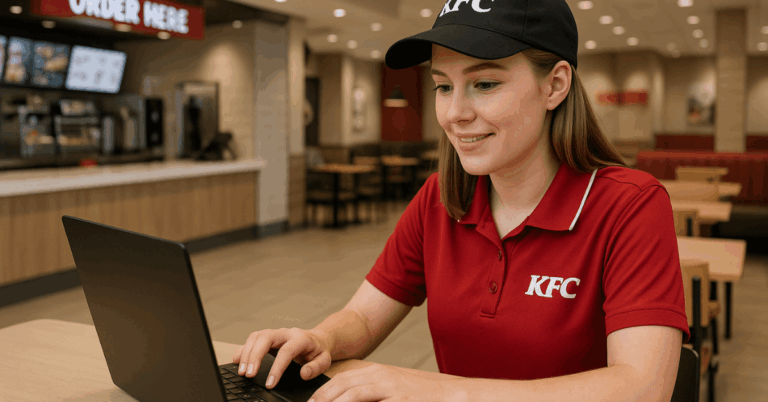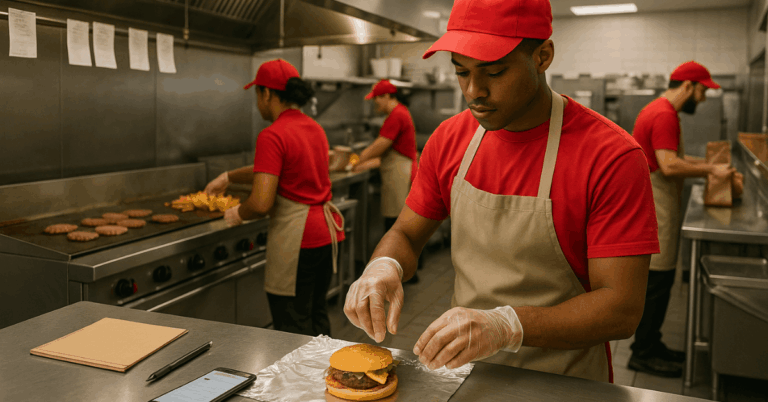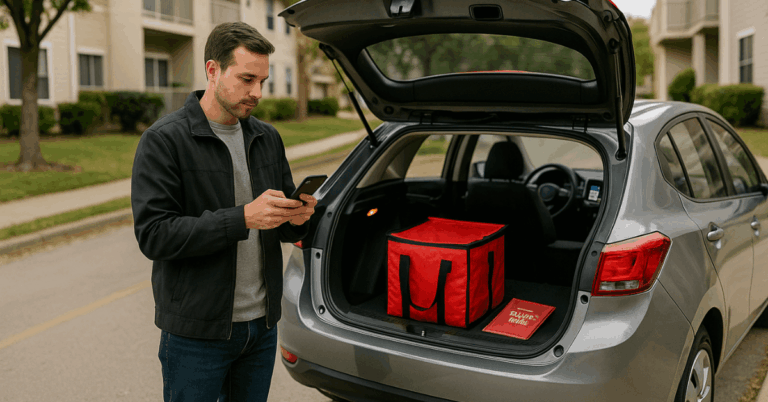Landing reliable Cleaning Jobs in USA takes clear steps: match role requirements, prepare compliant documents, target real openings, and pick the correct visa when sponsorship applies.
Employers value consistency, safety, and communication as much as speed and technique. Use a deliberate approach that proves reliability, protects your rights, and shortens the time from application to first shift.
What Cleaning Work Actually Includes
Cleaning roles span homes, hotels, hospitals, schools, offices, factories, and construction sites.
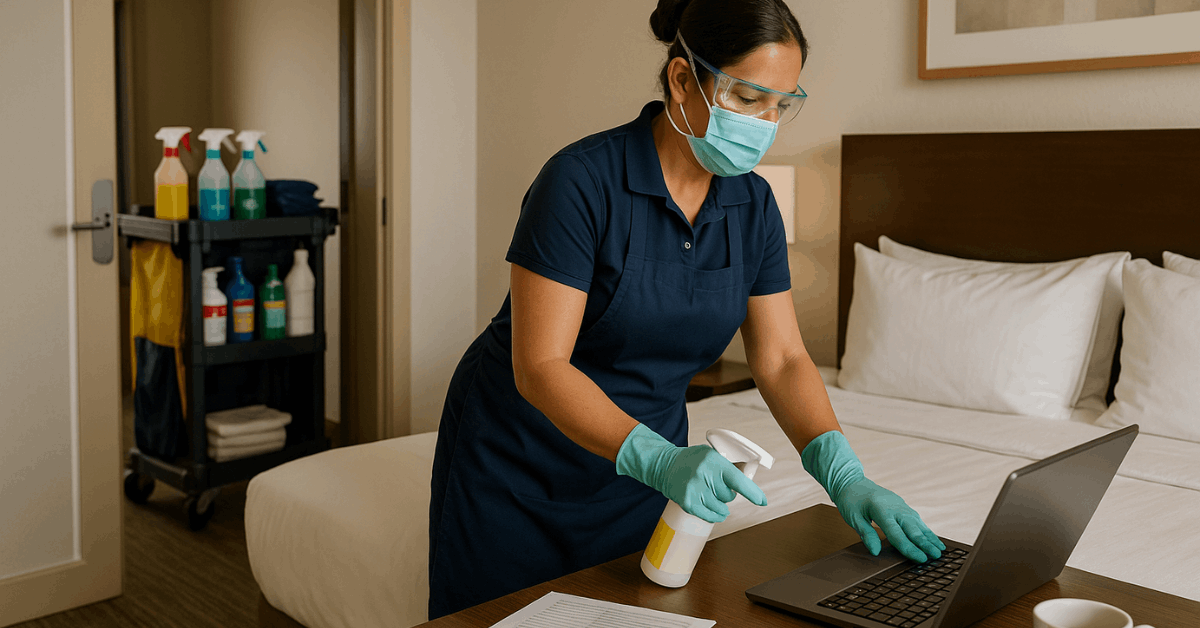
Day-to-day tasks include room resets, surface disinfection, trash removal, restroom resets, floor care, laundry, and supply restocking.
Strong time management and attention to detail matter more than formal schooling, though a high school diploma helps. Basic English for safety labels and supervisor notes improves fit immediately.
Who Employers Typically Hire
Hiring managers prioritize reliability, legal work authorization, and safe technique over perfect résumés. Consistent attendance, proof of prior cleaning or caregiving work, and positive references drive offers.
Demonstrated knowledge of chemicals, dilution control, color-coded cloths, and personal protective equipment (PPE) signals readiness for regulated sites such as clinics or food production.
Visa Pathways For Cleaning And Housekeeping Work
Applying from abroad requires the correct category when sponsorship is offered. Each pathway carries different rules, durations, and employer obligations.
Read program pages carefully, since misuse can jeopardize status or future applications. When unclear, consult the official agency page or a qualified immigration professional rather than blog hearsay.
H-2B: Temporary Non-Agricultural Workers
Seasonal or peak-load cleaning at hotels, resorts, or large venues can be sponsored under H-2B when employers prove a temporary need and a shortage of available local workers.
Employers first secure a temporary labor certification, then file a petition, and roles must end when the certified season closes. Program mechanics and caps are administered by USCIS and the Department of Labor.
B-1: Personal Or Domestic Employees
Domestic workers accompanying an eligible employer to the United States may qualify for B-1 in limited circumstances, subject to strict conditions, written contracts, and wage compliance.
This category does not authorize general labor for unrelated households or businesses. Always confirm that duties and employer relationships match the narrow B-1 rules.
J-1: Exchange Visitor Programs
Some hospitality training programs operate under J-1 exchange rules through designated sponsors.
These are cultural and training programs rather than open employment pipelines, and participants must follow program terms, host-site rules, and duration limits. Verify status and sponsor designation on official J-1 resources before proceeding.
Where To Find Real Openings
Hiring sources vary by city and season; mix channels to avoid scams and stale listings.
Focus on official employer career pages and reputable boards first, then expand to agencies with verifiable histories. Keep applications targeted rather than blasting generic résumés everywhere.
- Major job boards: Indeed, LinkedIn, and Glassdoor carry high-volume entry roles and larger employers.
- Specialized platforms: Care.com and Housekeeper.com help locate private homes and recurring housekeeping schedules.
- Hotel and hospital systems: Apply on company portals for better transparency, onboarding, and benefits eligibility.
- Staffing and facility services firms: Janitorial contractors place teams across office towers, schools, and stadiums.
- Community referrals: Local groups, faith networks, and tenant associations often share shift leads quickly.
Documents That Get Fast Approvals
Sections that involve lists benefit from a short framing note. Aim to present clean, complete packets the first time. Missing pieces slow verification and push candidates behind prepared applicants.
- Passport valid at least six months beyond planned stay.
- Experience proof: short résumé, duty list, letters from prior clients or supervisors.
- Education: high school diploma or equivalent when requested.
- Background and health: police certificate or background check, plus any required vaccinations for institutional sites.
- Certifications: basic safety or chemical-handling certificates if available, especially for healthcare or industrial settings.
Step-By-Step: Application To First Day
Hiring teams move faster when each checkpoint is handled in order. Follow a predictable sequence and keep copies of every file in one folder.
- Shortlist roles that match shift needs, location, and pay floor.
- Tailor a one-page résumé highlighting rooms per shift, floor-care equipment, and disinfection know-how.
- Submit through the employer’s portal; avoid fee-charging “guaranteed job” intermediaries.
- Complete screenings: identity, right-to-work, background, and any skill demos.
- For H-2B sponsorships, track the employer’s certification and petition milestones, then schedule your consular interview.
- Prepare for onboarding: uniform standards, footwear, vaccination proof, and banking details for payroll.
- Start with clear shift checklists; confirm supply closet access, chemical codes, and supervisor contact.
Rights, Pay, And Safety Essentials
All workers in the United States receive basic protections regardless of nationality or visa category. Expect the higher of federal or state minimum wage, overtime for eligible roles, a safe workplace, and anti-retaliation protections when reporting hazards.
Confirm payroll frequency, timekeeping method, and tip or stipend policies during onboarding. Learn site safety quickly: chemical Safety Data Sheets, eye protection, gloves, and ventilation rules for ammonia, bleach, or acids.
Institutional sites require rigorous protocols for infectious materials, sharps containers, and biohazard bags. Report injuries promptly and follow return-to-work instructions precisely. Employers should supply training and PPE; raise concerns immediately if tasks require chemicals without proper labels or guidance.
Build A Strong Application Profile
Stand out using concise accomplishments and concrete scale. Specify rooms cleaned per shift, occupancy levels, or square footage covered. Note experience with autoscrubbers, burnishers, extraction machines, or microfiber systems.
Include a brief sentence on cross-cultural communication, since teams often span multiple languages. For private homes, share comfort supporting pets, allergies, or fragrance-free routines when relevant.
Candidates seeking housekeeping jobs with visa sponsorship should state sponsorship readiness and prior U.S. seasons if any. That line helps recruiters filter quickly when time is short and cap windows are tight.
Interview Prep That Wins Offers
Prepare answers that prove reliability, speed, and safe habits rather than generic enthusiasm. Employers listen for thoughtful tradeoffs between pace and quality, plus willingness to learn site-specific routines.
- Explain your checklist for a checkout room or office night shift.
- Describe handling of mixing ratios, color coding, and cross-contamination prevention.
- Share a moment you flagged a hazard and prevented an injury or complaint.
- Outline communication style when a client changes priorities mid-shift.
- Discuss attendance systems used previously and how missed shifts were handled.
- Bring a copy of your résumé and one reference contact. Practice cleaning job interview questions aloud to smooth pacing and clarity.
Working Safely Every Shift
Follow OSHA cleaning safety guidelines by wearing appropriate PPE, labeling all secondary containers, and storing incompatible chemicals separately.
Ventilate small rooms during product use and keep Material or Safety Data Sheets accessible. Lift with legs, not the back, and rotate tasks to reduce repetitive strain. Track breaks, hydration, and footwear integrity to prevent slips and fatigue.
Paychecks, Overtime, And Scheduling
Confirm fair pay and overtime rules upfront, including overtime eligibility, premium rates, and public-holiday policies.
Many institutional roles use electronic timeclocks; ask how rounding rules affect daily totals.
Document schedule changes in writing to protect hours. For tipped roles such as hotel minibar restocking or concierge-adjacent tasks, request written tip allocation policies.
If Starting As An Independent Or Building A Small Team
Some workers eventually accept private clients or form micro-teams. Pricing must cover:
- labor,
- supplies,
- equipment,
- transit, taxes, and
- profit without exceeding local market ceilings.
Decide upfront whether jobs are hourly or fixed-bid, then scope homes or offices in person to avoid underestimates.
Include commute and parking, specialty chemicals, and any premium for post-construction, move-out, or medical-facility work. Written quotes with scope, exclusions, and cancellation terms reduce disputes later.
Special Notes For Hotels, Hospitals, And Schools
Hotel operations favor speed with quality: room turns, linen control, and minibar restocks.
Candidates targeting hotel housekeeping careers US should highlight checkout turnarounds, teamwork with maintenance, and guest-privacy etiquette.
Hospitals require additional immunizations and isolation-room protocols; list any prior clinical or long-term care experience. School contracts emphasize background clearance and daytime communication with staff and parents.
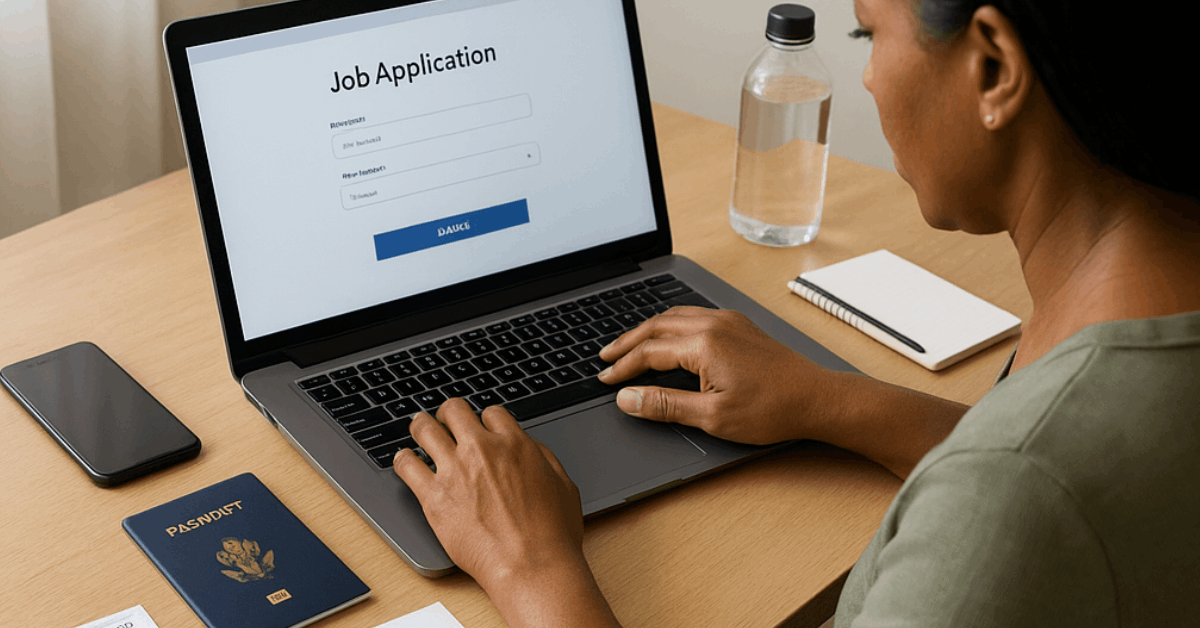
Practical Checklist Before Day One
Confirm uniform and shoe requirements, locker arrangements, and shift transport. Store supervisor and HR contacts in your phone.
Label personal PPE and bring a small notepad for room-by-room instructions. Photograph supply closets for quick reordering, if permitted. Set phone alarms for break timing, hydration, and closing checks.
Ethical Conduct And Client Trust
Respect privacy, access limits, and building security at all times. Decline tasks that violate policy, like off-the-clock errands or mixing private chemicals.
Report broken items promptly and offer incident notes to protect trust. Clear, respectful communication keeps long-term assignments stable and referral friendly.
Conclusion
Cleaning work rewards disciplined routines, safe technique, and steady communication. A precise application, correct visa category, clean paperwork, and focused interview prep will open doors quickly.
Keep training current, log accomplishments, and request higher-responsibility routes as supervisors notice progress.
Treat each contract as a reputation builder, and better shifts, higher wages, and stable teams follow naturally across the Cleaning Jobs in USA market.

